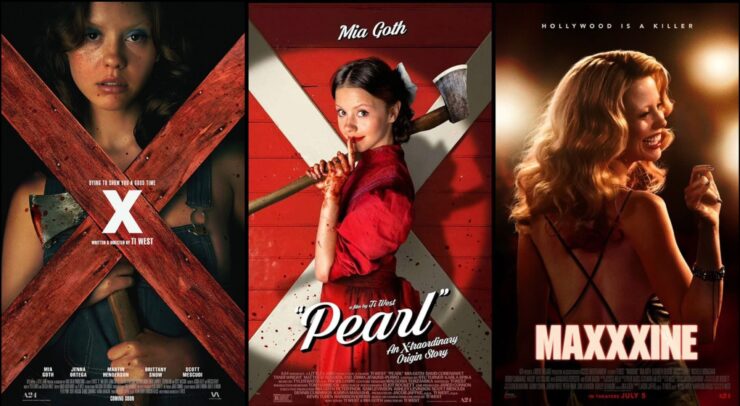Mia Goth, you are a star.
The sole survivor of the unexpected, nightmarish bloodbath in X (2022), Maxine Minx (Mia Goth) is now an adult film star in 1985 Los Angeles who successfully lands an audition for a highly controversial horror movie.
A notorious serial killer, known as the Night Stalker – based on a real killer of the same name – terrorizes the city. A mysterious, leather-clad murderer also targets her friends and colleagues, while sending her condemning evidence of her ties to the massacre – is it the Night Stalker, or a ghost from her past coming to haunt her?
Plagued by her trauma and chased by a determined middleman (Kevin Bacon), and tactless police officers, Maxine decides to track her friends’ murderer down herself. She rapidly plunges into an ordeal she hadn’t signed up for.
Goth remains consistent with her groundbreaking performances in the trilogy’s two other films, X and its prequel, Pearl (both 2022). Maxine is intense and obsessed with fame. However, she lacks the growth and startling relatability that resonated with me in Pearl. Admittedly, Maxine and Pearl are distinctively different characters, but I missed having that connection. Maxine doesn’t go through any particular changes over the course of the story, aside from suffering through chilling visions from her past.
The booming success of the MaXXXine’s predecessors apparently earned director Ti West a massive budget increase, in view of the star-studded cast. It included Lily Collins, Elizabeth Debicki, and Halsey, who aptly portray characters forming Maxine’s entourage.
However, I found the actresses to be recognizable to the point of distraction. I had a hard time looking past the other characters they have played – for instance, Debicki still sounded like Princess Diana to me, whom she embodied in the Netflix series The Crown (2016-2023).
Footloose star Kevin Bacon, however, commands nearly every scene he’s in as his character actively hunts Maxine, and Breaking Bad villain Giancarlo Esposito plays her fatherly, unapologetically iconic entertainment lawyer.
I reveled in the references to X and Pearl, as well as the devilishly good soundtrack, which featured songs like “Obsession” by Animotion, “Self Control” by Laura Branigan, and “Welcome to the Pleasuredome” by Frankie Goes to Hollywood.
Layered lighting, shadows, and veils of smoke intensify the suspense and gore of the events that unfold. The camera work and props successfully make us squirm – at one point, Maxine suffocates as disturbing hallucinations crawl across her skin, all while molding cast goo dribbles thickly down her face.
The “film-within-a-film” premise also leads to an adrenaline-pumped sequence reminiscent of a Western film as two characters charge after each other through various recognizable sets, like the Bates Motel House from Alfred Hitchcock’s Psycho (1960).
But despite its stylistic prowess, the film’s screenplay and denouement pale in comparison to its predecessors.
[Proceed with caution, spoilers ahead.]
Indeed, the story relies on the superfluous message of Hollywood’s already well-known toxic and contradictory nature. In order to achieve the level of fame she desires, Maxine arduously avoids the potentially career-killing association to the massacre from X, but rockets to stardom as she shoots her televangelist father-turned serial killer (Simon Prast) in the head in front of the police.
Maxine’s father returning to force her back onto the path he deems righteous culminates in a sequence that felt rushed and gave me a feeling of déjà-vu. Indeed, the police officers gunning her father down meet stomach-churning demises, literally clinging to far-gone dreams; Detective Torres (Bobby Cannavale) claws at the Hollywood sign as he rasps for breath after a bullet to the chest, reminiscing about his hopes of becoming an actor. It reminded me of the slaughters in X, and Pearl’s desperate desire to be a star. It was perhaps an intentional callback, but I found it to be redundant.
The story lacked substance in my opinion, exploring Maxine’s trauma without her character undergoing any significant growth – her determination and remarkable sense of self-preservation remain unchanged with regards to X. She is compelling as the “final girl” once more, giving herself pep talks in the mirror and repeating the mantra “I will not accept a life I do not deserve” – but it’s nothing new.
In the end, Maxine gets what she always wanted: the filming of her career-revolutionizing production continues. Her stardom only grows as she is heeded as a heroine on a talk show for ridding Los Angeles of a serial killer.
I found the incorporation of the Night Stalker to be intriguing, especially since it referenced a real-life serial killer, but it turned out to be window-dressing. Instead, her father is revealed as the absurdly cartoonish villain, screaming his head off (literally, by the end).
I found the deceptively harmless elderly couple in X significantly more terror-inducing, viciously and bitterly slaughtering the people “flaunting their youth” on their property. Indeed, the plot claws our deepest fears out of the dark corners of our subconscious and allows them to play out in troubling proportions: the fear of aging and the ruthless marching on of time, carrying with it hopes and dreams.
Pearl explores the woman’s backstory from the homicidal couple, who obsessed over Maxine because she reminded her of herself. It is a profound and unsettling portrait of a disturbed young woman; she wants nothing more than to be loved and seen, and freedom from the parental chains binding her to their secluded farm. Though this often manifests itself in explosive outbursts of bloodthirsty rage, some of her feelings were justified in my eyes. Her heartfelt, vulnerable monologue, as well as her desire for validation and to improve herself were endearing and relatable.
MaXXXine provides a polished conclusion to the trilogy, oozing with 80s references. As an ardent fan of the other two films, it was a delight for me to spot allusions to them. However, I found the film to be unnecessary since it doesn’t add anything significant to the stories developed previously, and lacked the “X-factor” Maxine supposedly exudes. Nevertheless, this trilogy has put Mia Goth and director Ti West on the map for general audiences, giving way to a fresh, more thoughtful take on the horror-slasher genre.





